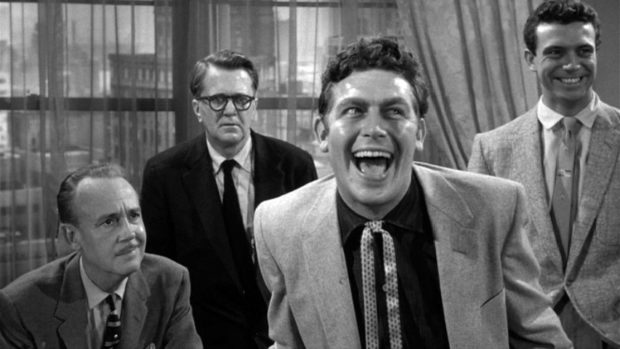
 One of the great American satires on film, A Face in the Crowd was ahead of its time in pinpointing the dangerous intersection of politics and entertainment.
One of the great American satires on film, A Face in the Crowd was ahead of its time in pinpointing the dangerous intersection of politics and entertainment.
In 1957, three years before Andy Griffith became everybody’s small town sheriff TV Dad, he made his film debut in a movie by Elia Kazan called A Face in the Crowd. And it was about as far from Mayberry as you could get.
Patricia Neal plays Marcia Jeffries, the host of an Arkansas radio show who goes out every week to find interesting and unusual people to highlight on her program that is called, “A Face in the Crowd.” When she visits a small town jail in search of a subject she encounters Larry Rhodes, doing time in the drunk tank with his guitar, which he says, “beats a woman any time.” Rhodes has written a few corny but amusing songs, and Miss Jeffries lets him sing them into her microphone, to which he adds a peppering of folksy wisdom. The show gets a big positive response from listeners, so after Rhodes gets out, Jeffries decides to give him some more radio exposure, in the meantime also giving him the nickname “Lonesome Rhodes.” More than the songs, it’s Rhodes’ off-the-cuff cracker barrel wisdom on a variety of subjects that captures the attention of audiences. Soon he goes from radio to TV, and then, inevitably, someone gets the bright idea of bringing him into politics.
The screenplay was by Budd Schulberg, notorious for his satirical Hollywood novel “What Makes Sammy Run?” and the screenwriter for Kazan on the Oscar-winning On the Waterfront a few years before. Here his sly, humorous side has free reign. He even wrote Lonesome Rhodes’ songs. Kazan, for his part, seems much looser in style than in any of his other films, which serves the story pretty well, but you might even consider this more of a Schulberg film than a Kazan.
The movie features early appearances by Walter Matthau and Lee Remick. Patricia Neal is her usual excellent self. But of course it’s the performance of newcomer Andy Griffith as Lonesome Rhodes that propels the picture. He puts everything he’s got into the role, projecting a grinning, maniacal cheerfulness, that masks an ever more uncontrolled egotism. It’s brilliant work, and it made him a star.
A Face in the Crowd was a groundbreaking film, way ahead of its time. It satirizes the new connections that were being made between politics and the media. Lonesome Rhodes’ personality is more important than any actual message he may have about social issues, certainly more important than policies. The film also was the first to pinpoint the hucksterism of promoting the supposed common, everyday man of the people, with his homespun wisdom and crowd-pleasing sense of humor, as a political answer to American problems. What starts out as terribly funny eventually becomes simply terrifying—as a phony television hero starts to gain real power, which includes the power to wreck people’s lives through his ignorance. Did I mention that it was ahead of its time?
A Face in the Crowd got a rather mixed critical reception upon its release. Apparently it made some people uncomfortable. In the years since, it’s gradually been recognized as one of the great satires in American film.

